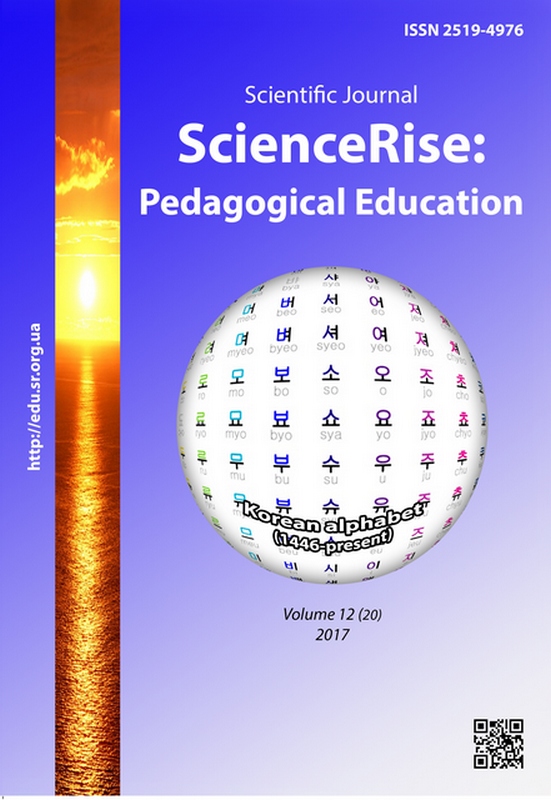E-learning course of “Antic literature” during the training of students-philologists
DOI:
https://doi.org/10.15587/2519-4984.2017.119776Keywords:
MOODLE environment, e-learning course, educational process, educational and methodical supportAbstract
The article deals with theoretically proved definition of the notion “MOODLE environment”, and it is analyzed the main principles of functioning of this software (program) product. The notion “e-learning educational course” has been revealed, its structural elements and the specific of organizing the work are characterized. The differences between electronic learning course and electronic manual are described in this work. The didactic expediency of introduction e-learning courses into the educational process of higher educational establishments is argued. The advantages of using e-learning course either for students or instructor are traced out. Using of e-learning course gives the opportunity to combine fundamentally the elements of the traditional forms of education (instructor, practical courses, self-assessment work) with the informational and communicational technologies. The introduction of e-learning course into the educational process of higher educational establishments is favourable to the development of independent thinking, initiative and responsibility for performing work. The practical experience of using “Antic literature” e-learning course developed in the MOODLE environment for the students of the faculty of foreign languages is offered. It is proved that using of “Antic literature” e-learning course gives the opportunity to individualize and systematize educational process, organize communicative interaction between a instructor and a student, establishes chronological ambits of students’ doing the tasks effectively realise checking control and self-control of students’ knowledge with application of different tasks, assists the efficient learning of educational material
References
- Zakon Ukrayiny «Pro vyshchu osvitu». Stattia 26. Osnovni zavdannia vyshchoho navchalnoho zakladu [Law of Ukraine «On Higher Education» Article 26. The main tasks of the higher educational institution] (2014). Available at: https://urist-ua.net/закони/про_вищу_освіту/стаття_26
- Morze, N. V., Hlazunova, O. H. (2012). Formuvannya y otsinyuvannya IK-kompetentnostey naukovo-pedahohichnykh pratsivnykiv v umovakh vprovadzhennya dystantsiynykh tekhnolohiy [Forming and evaluation of ict competence of scientific and pedagogical staff in conditions of distance learning technologies introduction]. Informatsiini tekhnolohii i zasoby navchannia, 6 (32). Available at: https://journal.iitta.gov.ua/index.php/itlt/article/view/758/568
- Tverezovs'ka, N. T. (2009). Interaktyvni innovatsiyni tekhnolohiyi u systemi vyshchoyi osvity [Interactive innovative technologies in the system of higher education]. Visnyk Natsional'noho tekhnichnoho universytetu Ukrayiny «Kyyivs'kyy politekhnichnyy instytut». Filosofiya. Psykholohiya. Pedahohika, 3 (27), 236–240.
- Yevsyukova, L. S. (2011). E-LEARNING: perevahy i problemy [E-LEARNING: benefits and challenges]. Visnyk Cherkas'koho universytetu. Seriya «Pedahohichni nauky», 211 (2), 79–85.
- Smul'son, M. L., Mashbyts, Yu. I., Zhaldak, M. I. et. al.; Smul'son, M. L. (Ed.) (2012). Dystantsiyne navchannya: psykholohichni zasady [Distance learning: psychological principles]. Kirovohrad: Imeks-LTD, 240.
- Kuznetsova, I. O. (2012). Elektronnyy pidruchnyk yak vazhlyvyykomponent systemy dystantsiynoho navchannya [Electronic textbook as an important component of the distance learning system].Visnyk SevNTU. Seriya: Pedahohika, 127, 63–67.
- Vember, V. P. (2008). Metodychni osnovy proektuvannya ta vykorystannya elektronnoho pidruchnyka z informatyky dlya zahal'noosvitn'oyi shkoly [Methodical bases for designing and using an electronic textbook for informatics for a comprehensive school]. Natsionalnyi pedahohichnyi universytet imeni M. P. Drahomanova. Kyiv, 20.
- Morze, N. V., Hlazunova, O. H. (2009). Kryteriyi yakosti elektronnykh navchal'nykh kursiv, rozroblenykh na bazi platform dystantsiynoho navchannya [Criteria for the quality of e-learning courses developed on the basis of distance learning platforms].Informatsiyni tekhnolohiyi v osviti, 4, 63–76.
- Morze, N. V., Hlazunova, O. H. (2010). Atestatsiya elektronnykh navchal'nykh kursiv u systemi dystantsiynoho navchannya [Certification of electronic training courses in the system of distance learning]. Informatsiyni tekhnolohiyi i osviti, 7, 47–68.
- Tryus, Yu. V., Herasymenko, I. V., Franchuk, V. M.; Tryus, Yu. V. (2012). Systema elektronnoho navchannya VNZ na bazi MOODLE: Metodychnyy posibnyk [The system of electronic education of higher educational institutions based on MOODLE]. Cherkasy, 220.
Downloads
Published
How to Cite
Issue
Section
License
Copyright (c) 2017 Natalia Hrytsak

This work is licensed under a Creative Commons Attribution 4.0 International License.
Our journal abides by the Creative Commons CC BY copyright rights and permissions for open access journals.
Authors, who are published in this journal, agree to the following conditions:
1. The authors reserve the right to authorship of the work and pass the first publication right of this work to the journal under the terms of a Creative Commons CC BY, which allows others to freely distribute the published research with the obligatory reference to the authors of the original work and the first publication of the work in this journal.
2. The authors have the right to conclude separate supplement agreements that relate to non-exclusive work distribution in the form in which it has been published by the journal (for example, to upload the work to the online storage of the journal or publish it as part of a monograph), provided that the reference to the first publication of the work in this journal is included.








